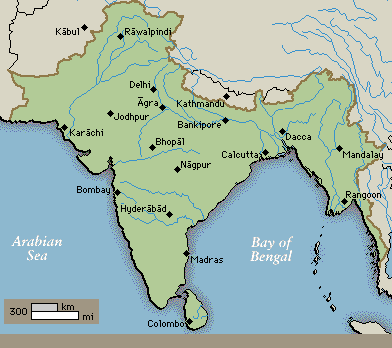


India's boundaries were gradually expanded when the British government took over the administration of India from the British East India Company. Prior to gaining independence on August 15, 1947, India's borders included the now independent countries of Pakistan, Bangladesh, Myanmar (formely known as Burma), and SriLanka (Ceylon)
BRITISH INDIA, 1858
Many
of the abuses prevalent in India during the rule of the East India
Company were eradicated or modified after the British government
assumed control of Indian affairs. Important fiscal, governmental,
juridical, educational, and social reforms were instituted and the system
of public works inaugurated by Dalhousie was vastly extended. The
British government had inherited numerous difficult problems, including the
impoverished condition of the masses of the Indian people, popular resentment
over the country's colonial status, and a growing spirit of nationalism. Frequent
disastrous famines, beginning with the Orissa famine of 1866, which took the
lives of 1.5 million people, contributed substantially to political unrest.
In 1876 the British government, then headed by Benjamin Disraeli, proclaimed
Queen Victoria empress of India.
Political Ferment
In the closing years of the 19th century and during the first decade of the 20th century, the social and political ferment in India spread widely. Occidental political doctrines and methods were introduced by Hindus who had studied in British and American universities. Under the stimulus of vigorous propaganda campaigns in the native press, mass meetings, and secret political organizations, Indian nationalism began to threaten seriously the British position in India. A number of associations, dedicated to the struggle against British rule, had been created in the decades following the Sepoy Mutiny. Of these, the most influential was the Indian National Congress, founded in 1885. This organization, which enlisted the support of many prominent Hindus and Muslims, gradually heightened the political consciousness of the masses and accelerated the trend toward national unification. On the cultural level, the celebrated poet and educator Rabindranath Tagore made enduring contributions to the cause of Indian unity.
The Indian National Congress drew inspiration and encouragement from the Japanese victory in the Russo-Japanese War of 1904 and 1905, a practical demonstration of the latent power of the Asian peoples. Hostile manifestations against British rule became more and more frequent, particularly in Bengal. The more radical nationalists resorted to assassination, bombings, and other acts of terrorism. Retaliatory measures by the colonial authorities were countered by a popular boycott of British goods.
Repressive Measures
Condemning most of the nationalist activities as seditious, the British government adopted a special criminal code to deal with the situation. Among other measures, this code provided for trial without jury for people accused of treason and for deportation or summary imprisonment for agitators. These repressive steps were followed in 1909 by the India Councils Act, which introduced a limited degree of self-government in India. Dissatisfied with this concession to Indian demands for independence, the nationalist movement continued to gain headway.
A new and disruptive current had meanwhile been introduced into the movement for national unification with the formation in 1906 of the Muslim League. Established with the encouragement of the British government and supported primarily by those Muslims who, for reasons of self-interest, loyalty to Great Britain, or Muslim nationalism, were hostile to the objectives of the Indian National Congress, the league succeeded in diverting significant numbers of the Indian Muslim youth and intelligentsia from the independence struggle. Many outstanding Muslims, however, including the influential journalist Abul Kalam Azad, registered disapproval of league policy, resigned from the organization, and joined the Indian National Congress.
Joint Campaign
Following the outbreak of World War I (1914-1918), large numbers of the Indian people, including both Hindus and Muslims, rallied to the British cause. More than 1.2 million Indians participated in the British war effort, giving valiant and loyal service in all theaters of the conflict. The nationalist movement, generally quiescent during the first two years of the war, resumed the campaign for fundamental political reforms in the fall of 1916. The campaign was initiated by a joint declaration of minimum demands by the Indian National Congress and by the Muslim League, which had been forced to abandon its pro-British policy after Turkey, a Muslim country, entered the war on the side of the Central Powers. There followed a policy of pronouncement from the British government in August 1917, promising an increase of "… the association of Indians in every branch of the administration and the gradual development of self-governing institutions … in India…."
